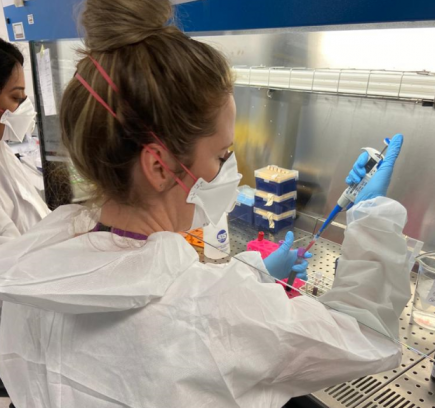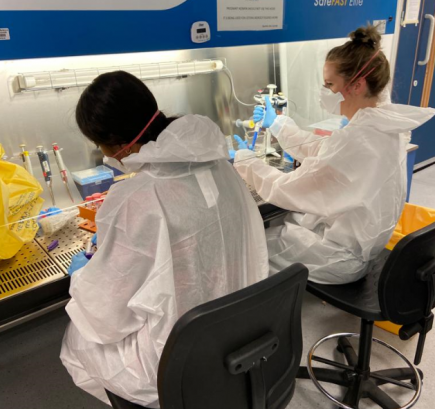Manchester’s scientists and clinicians have formed a rapid response research group to find ways to save lives nationally and globally from coronavirus.
The group spread across Greater Manchester will harness the power of hundreds of researchers from the University of Manchester.
Professor Graham Lord, Vice-President and Dean of the Faculty of Biology Medicine and Health at The University of Manchester, said: “The Research Rapid Response Group brings together the research and innovation strengths of our partnerships in an unprecedented way to focus on this public health crisis.
“Our aims are to minimise lives lost and reduce the impact of the pandemic on Greater Manchester’s health and social system and the wider community.”
Researchers, teachers, students and professional service staff are combing their knowledge to contribute to the local, national and international response to the disease.
The life saving effort will also involve clinical colleagues at Manchester University NHS Foundation Trust (MFT) and the Northern Care Alliance NHS Group.
Sir Michael Deegan, Group Chief Executive of MFT said: “This is the most challenging time the NHS has faced.

“The pressure on our staff is immense and I am grateful to every single one of them, as they work day and night to provide the very best care and treatment to not those just diagnosed with COVID-19, but the thousands of other patients we are caring for with all manner of health care issues.
“The impact of COVID-19 on our NHS services cannot be underestimated. That’s why it’s imperative that the cutting-edge research and innovation we are proud to have at MFT joins with our academic and clinical partners across Greater Manchester to support the worldwide effort to tackle COVID-19.”
The work is backed by Health Innovation Manchester (HInM), which accelerates research and innovation to improve the health and wellbeing of Greater Manchester’s 2.8m citizens.
Further support is also being provided by the NIHR Manchester Biomedical Research Centre (BRC) and NIHR Manchester Clinical Research Facility (CRF).
KEY PRIORITIES
Led by Professor Ian Bruce, Director of the BRC, Academic Director of HInM and a Professor of Rheumatology at MFT’s Kellgren Centre, the group’s work is focused on seven key areas.
These areas are; new treatments, disease mechanisms, patient assessment, social care impact, patients with existing health conditions, rapid diagnosis and prevention/vaccination.
To find new treatments the group will play a full part in the leadership, coordination and execution of clinical trials.
These are focused on new therapies aimed at improving clinical outcomes and are employing a range of therapies including antivirals, anti-inflammatory agents and others.
Manchester’s virology and inflammation/immunology teams are working to find out which patients acquire the virus and why some patients have a particularly aggressive illness course.
Dr Lizzie Mann an immunologist working inside the Lydia Becker Institute for immunology and inflammation Lab explained the work they are doing.
She said: “We are characterising immune responses in COVID-19 patients that have been admitted, working alongside clinicians to try and understand the course of the disease, predict which patients will go on to severe disease and which sorts of treatments they may respond to.”
By understanding the disease mechanisms, such work will then suggest new treatment approaches which they can then test.

A collaboration between the University and NHS trusts, will use data science, mathematics and computer modelling to identify and track patients with symptoms.
This means they can focus on those who are deteriorating and who need more intensive interventions at an earlier stage.
During a global pandemic, protecting the most vulnerable in our society becomes an even greater and more urgent challenge.
This is compounded by the need to safeguard those who care for them.
Public health and applied health researchers are working on developing and evaluating ways to reduce the impact of the virus on public health.
This will relieve pressure on the NHS and social care systems because so many people are infected, especially in social care.
Many patients with pre-existing diseases who are on treatments that suppress their immune systems are particularly vulnerable to COVID-19.
Manchester’s researchers are tracking the impact on patients with existing health conditions to provide better management of their background condition and treatment during such outbreaks.
Testing for COVID-19 to understand who may be carrying the virus and be able to infect others is vitally important across the globe.
Researches based at Saint Mary’s Hospital are working to develop and deploy rapid diagnosis testing platforms to scale-up for mass, widespread testing during this acute outbreak.
‘OUTSTANDING SPEED’
The group is in discussions with manufactures who are developing vaccines to prevent COVID-19.
The Greater Manchester partnership has experience of deploying clinical trials at large scale within the community, for example the recent Salford Lung Study.
This approach and population-based tracking of patients will help support rapid recruitment and read out of results for any future vaccination trials.
This means vaccines can be in use as soon as possible.
Prof Ian Bruce praised Manchester’s scientific community and emphasised the importance of research to fight this new virus and save lives.
He said: “The speed at which our scientific community has stepped up to respond to the COVID-19 outbreak is outstanding and a testament to Greater Manchester’s strong clinical-academic leadership and research assets.
“Research has a significant role in understanding more about this new disease, how to tackle it and the longer-term impact this pandemic will have on communities.”



